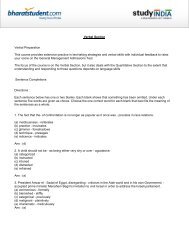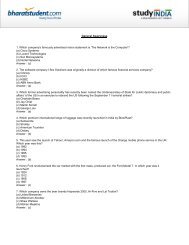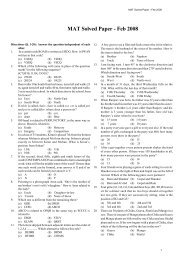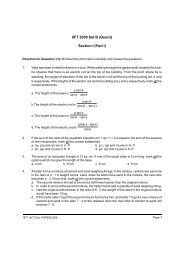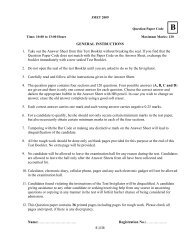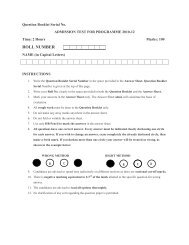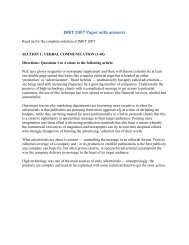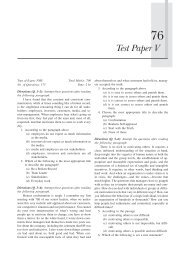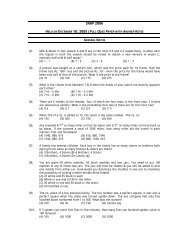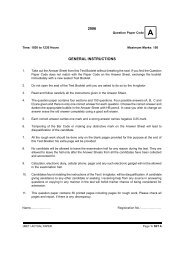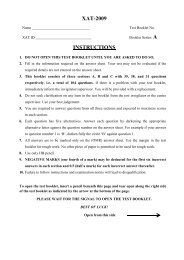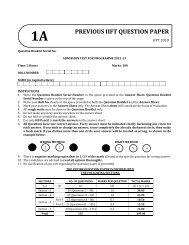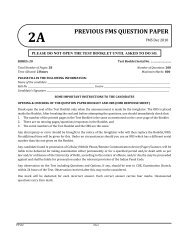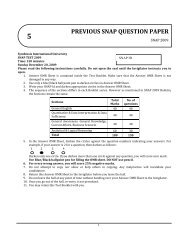SERIES 11 Test Booklet Serial No - Bharatstudent.com
SERIES 11 Test Booklet Serial No - Bharatstudent.com
SERIES 11 Test Booklet Serial No - Bharatstudent.com
Create successful ePaper yourself
Turn your PDF publications into a flip-book with our unique Google optimized e-Paper software.
essentially have access to a single gene pool and hence to the adaptive<br />
mechanisms of the entire bacterial kingdom.<br />
This global trading of genes, technically known as DNA re<strong>com</strong>bination, must rank as one of the<br />
most astonishing discoveries of modern biology. 'If the genetic properties of the microcosm were<br />
applied to larger creatures, we would have a science-fiction world,' write Margulis and Sagan, 'in<br />
which green plants could share genes for photosynthesis with nearby mushrooms, or where people<br />
could- exude perfumes; or grow ivory by picking up genes from a rose or a walrus.'<br />
The speed with which drug resistance spreads among bacterial <strong>com</strong>munities is dramatic proof that<br />
the .efficiency of their <strong>com</strong>munications network is vastly superior to that of adaptation through<br />
mutations. Bacteria are able to adapt to environmental changes in a few years where larger<br />
organisms would need thousands of years of evolutionary adaptation. Thus microbiology teaches<br />
us the sobering lesson that technologies like genetic engineering and a global <strong>com</strong>munications<br />
network, which we consider to be advanced achievements of our modern civilization, have been<br />
used by the planetary web of bacteria for billions of years to regulate life on Earth.<br />
The constant trading of genes among bacteria results in an amazing variety of genetic structures<br />
besides their main strand of DNA. These include the formation of viruses, which are not full<br />
autopoietic systems but consist merely of a stretch of DNA or RNA in a protein coating. In fact,<br />
Canadian bacteriologist Sorin Sonea has argued that bacteria, strictly speaking, should not be<br />
classified into species, since all of their strains can potentially share hereditary traits and, typically,<br />
change up to fifteen percent of their genetic material on a daily basis. 'A bacterium is not a<br />
unicellular organism,' writes Sonea, 'it is an in<strong>com</strong>plete cell belonging to different chimeras<br />
according to circumstances. In other words, all bacteria are part of a single microcosmic web of<br />
life'.<br />
99. If all human beings started behaving like bacteria, which of the following would be the most<br />
desired out<strong>com</strong>e by all humanity:<br />
(1) Creativity and innovation will increase<br />
(2) Greater unity in diversity<br />
(3) Population increase<br />
(4) We shall be<strong>com</strong>e identical to each other and be free of conflict<br />
100. Which three processes are responsible for evolution:<br />
(1) Random mutation; Rapid division of genes in bacteria; Genes exchange in bacteria<br />
(2) Random exchange of genes in bacteria; Speedy multiplication of bacteria; Creative<br />
mutation<br />
(3) DNA self replication; Autopoieses; Gene pool theory



